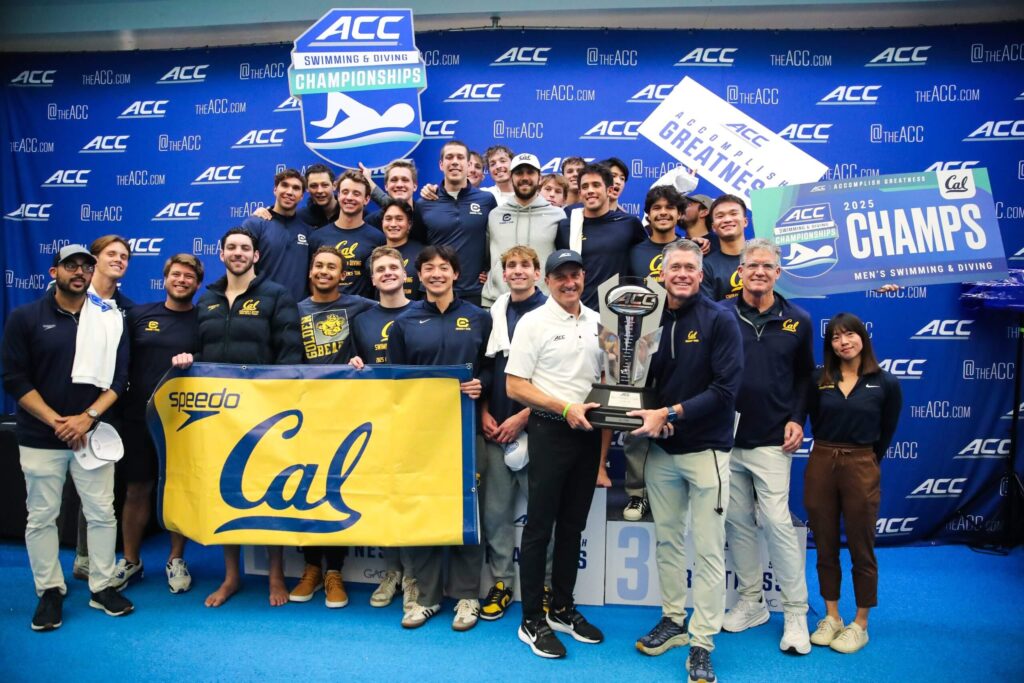Conference Realignment Produces Odd But Exciting Swimming Results, With Usual NCAA Greatness to Come
The men’s swimming and diving winner of the Atlantic Coast Conference, California. Second place went to Stanford, also off a cross-country flight from the Bay Area. NC State, a charter member of the conference with 33 previous titles and nine wins in the previous 10 years fell to third place.
Schools from the west coast finished 1-2 in a conference explicitly described for its east-coast geography. On the women’s side, Stanford placed second and Cal fourth. Make it make sense.
Cal and Bay-Area rival Stanford ended up competing last week in Greensboro, N.C., because of football and television contracts, not for any reasons that benefitted the swim and dive programs. The Pac-12, one of the sport’s strongest conferences for decades, was on shaky ground after USC and UCLA announced their departures for the Big Ten, and when the conference was unable to agree upon a new TV rights deal, it completely disintegrated.
Oregon and Washington moved to the Big Ten, followed by Arizona, Arizona State, Colorado and Utah heading to the Big 12, leaving just Cal and Stanford alongside Oregon State and Washington State in the conference. Given a chance to join the ACC, Cal and Stanford accepted, as did SMU. The schools agreed to enter the ACC’s revenue-sharing model at a lower level, and their athletic teams would accept numerous cross-country flights to conference matchups as a new reality.
Such is the state of college athletics that swimming must accept what it gets, leaving coaches to make the most of a less-than-ideal situation. As a result, Cal and Stanford raced exactly zero ACC rivals in a dual meet this year aside from three different competitions against each other. They instead continued competing against their west-coast rivals now in different leagues.
Stanford’s Torri Huske — Photo Courtesy: Jaylynn Nash/ACC
The same circumstances prompted the Stanford women to consider sending their star swimmers home early and skip the last day-and-a-half of racing. The idea would have been to focus on rest preparation for the NCAA Championships next month.
Leaving early would not have been a hard decision to justify, even if it hurt the conference meet. It also would not have been the first time conference championships have been devalued throughout college sports with a focus on the national level.
For elite teams in men’s and women’s college basketball, losing earlier than expected in a conference tournament is no big deal, allowing coaches and players extra time to prep for the NCAA Tournament. In the recently-completed first year of the College Football Playoff, neither team that qualified for the national championship game had even competed in a conference championship game (with Notre Dame eschewing membership in a conference at all). Top teams have floated the notion of skipping conference title games in future years so a loss could not hurt their seeding for the Playoff.
Surely, the next few years will see a team depart early from its conference meet or completely hold out a group of top swimmers. Winning these meets remains a valuable achievement for swim teams, but as with most other collegiate sports, there is little bearing on a team’s national-level performance. Several squads, including the Cal men, have won national titles in years they were beaten at conference meets.
So does college swimming need a massive overhaul, with new incentives to prioritize the regular season and conference meets so that coaches do not view these competitions as steppingstones to the NCAA Championships? No, not with the current setup still producing a flurry of record-breaking swims and not in the current reality of college athletics.
Next season, revenue sharing will be introduced to the Power Four conferences plus select other leagues that opt in, and universities will prioritize performance in revenue sports, namely football and basketball, to an even greater extent than before. Swimming and diving programs are an obvious target for athletic departments seeking to save a few million dollars, and the prospect of massive changes to the sport could give a convenient excuse to put programs on the chopping block. The survival of college swimming depends on its ability to work within its current constraints.
Most important are the NCAA Championships, one of the most intense competitions in the world, arguably harder to qualify for than U.S. Olympic Trials. NCAAs is the rare meet that is not a stepping-stone to something else; similar to the Olympic Games, eight swimmers line up, and the results of racing matter, with little concern for swimming best times but rather scoring as many points as possible. Sure, the national meets always produce a flurry of astounding record-breaking swims, but that’s not the ultimate goal.
The NCAA Swimming and Diving Championships are a treasure for the sport and perhaps the only aspect of this championship season that will look normal during a stretch that has forever altered the fabric of the sport. Protecting this must be the central focus as swimming tries to find a home in this new era.

